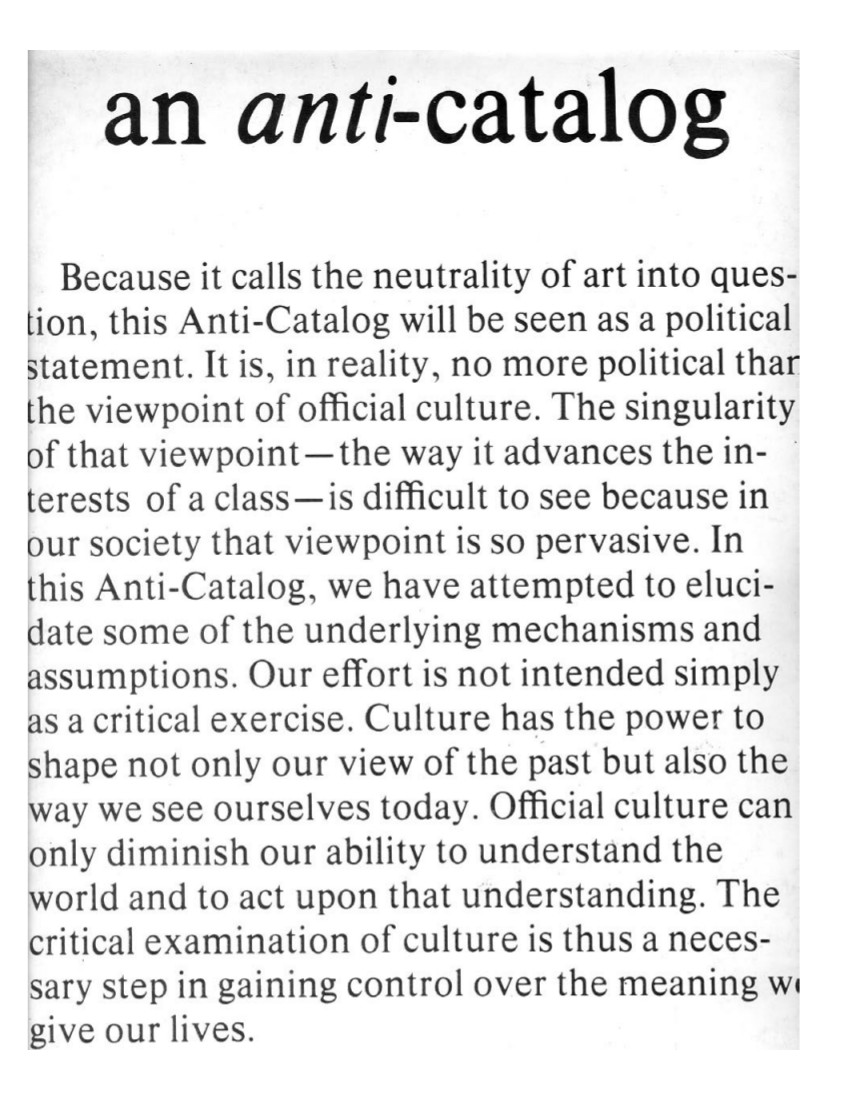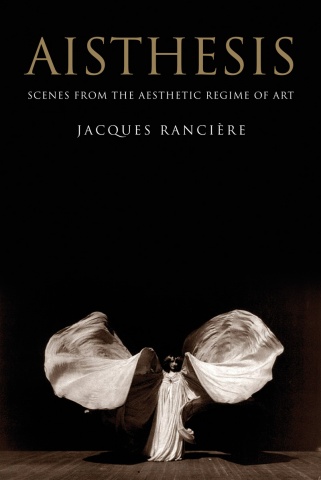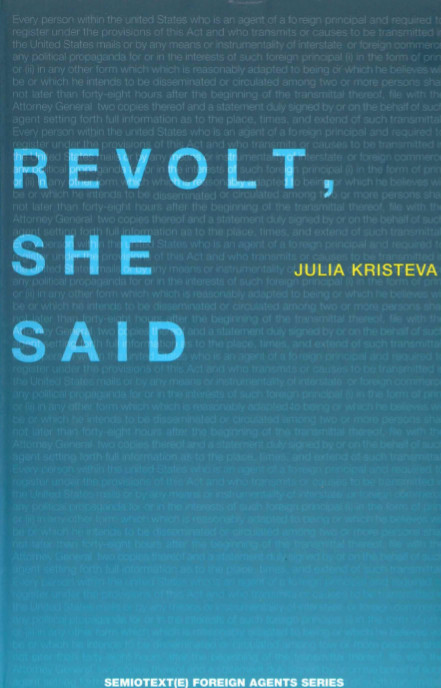an anti-catalog (1977)
Filed under catalogue | Tags: · activism, art, politics

“An Anti-Catalog was the work of the Catalog Committee of the group Artists Meeting for Cultural Change (AMCC). A landmark publication of the 1970s, its purpose was to protest the Whitney Museum of American Art’s bicentennial exhibition, which was titled Three Centuries of American Art. The Whitney show featured John D. Rockefeller III’s collection of mainly eighteenth and nineteenth-century American art–a collection that featured only one African American and one woman artist.
The Catalog Committee, which consisted of fifteen artists and two art historians, spent almost a year producing an eighty-page book containing articles and documents. Originally conceived as a critique of art historian E.P. Richardson’s catalog for the Whitney exhibition, the committee evolved ideas for pictorial essays that would encompass native American art, African-American art, art by women, critiques of pervasive class bias in the art world, and critical examinations of cultural institutions. As the committee wrote in its description of its project, ‘we share the belief that culture should no longer exist merely as an extension of the economic interests or the personal ‘tastes’ of the wealthy and powerful. Nor can we hope to transform culture outside of a struggle to transform the society from which it springs.’ Strong words that have lost little of their relevance for today’s cultural scene.” (Alan Wallach)
Written, designed, and produced by Rudolf Baranik, Sarina Bromberg, Sarah Charlesworth, Susanne Cohn, Carol Duncan, Shawn Gargagliano, Eunice Golden, Janet Koenig, Joseph Kosuth, Anthony McCall, Paul Pechter, Elaine Bendock Pelosini, Aaron Roseman, Larry Rosing, Ann Marie Rousseau, Alan Wallach, Walter Weissman.
Publisher Artists Meeting for Cultural Change, New York, 1977
80 pages
via Dark Matter Archives, via Primary Information
Jacques Rancière: Aisthesis: Scenes from the Aesthetic Regime of Art (2011/2013)
Filed under book | Tags: · aesthetics, art, art history, art theory, body, cinema, dance, film, life, literature, music, painting, pantomime, philosophy, photography, poetry, politics, representation, sculpture, theatre, theory

Rancière’s magnum opus on the aesthetic.
“Composed in a series of scenes, Aisthesis–Rancière’s definitive statement on the aesthetic–takes its reader from Dresden in 1764 to New York in 1941. Along the way, we view the Belvedere Torso with Winckelmann, accompany Hegel to the museum and Mallarmé to the Folies-Bergère, attend a lecture by Emerson, visit exhibitions in Paris and New York, factories in Berlin, and film sets in Moscow and Hollywood. Rancière uses these sites and events—some famous, others forgotten—to ask what becomes art and what comes of it. He shows how a regime of artistic perception and interpretation was constituted and transformed by erasing the specificities of the different arts, as well as the borders that separated them from ordinary experience. This incisive study provides a history of artistic modernity far removed from the conventional postures of modernism.”
First published as Aisthesis : Scènes du régime esthétique de l’art, Éditions Galilée, 2011
Translated by Zakir Paul
Publisher Verso Books, 2013
ISBN 1781680892, 9781781680896
304 pages
via falsedeity
Reviews: Hal Foster (London Review of Books), Joseph Tanke (Los Angeles Review of Books), Marc Farrant (The New Inquiry), Ali Alizadeh (Sydney Review of Books), Jean-Philippe Deranty (Parrhesia).
Roundtable discussion with Rancière at Columbia (video, 43 min)
Selected interviews and reviews (in French)
Julia Kristeva: Revolt, She Said (2002)
Filed under book | Tags: · art, disobedience, interview, philosophy, politics, psychoanalysis, revolution

“May ’68 in France expressed a fundamental version of freedom: not freedom to succeed, but freedom to revolt. Political revolutions ultimately betray revolt because they cease to question themselves. Revolt, as I understand it—psychic revolt, analytic revolt, artistic revolt—refers to a permanent state of questioning, of transformations, an endless probing of appearances.
In this book, Julia Kristeva extends the definition of revolt beyond politics per se. Kristeva sees revolt as a state of permanent questioning and transformation, of change that characterizes psychic life and, in the best cases, art. For her, revolt is not simply about rejection and destruction—it is a necessary process of renewal and regeneration.”
An Interview by Philippe Petit
Translated by Brian O’Keeffe
Edited by Sylvère Lotringer
Publisher Semiotext(e), 2002
Foreign Agents series
ISBN 1584350156, 9781584350156
139 pages
Reviews: Simone Roberts (Common Knowledge), Pramod K. Nayar (Philosophy in Review), Philip Goodchild (Ars Disputanti), Adrian O. Johnston (Metapsychology).
PDF (updated on 2017-6-26)
Comment (0)
